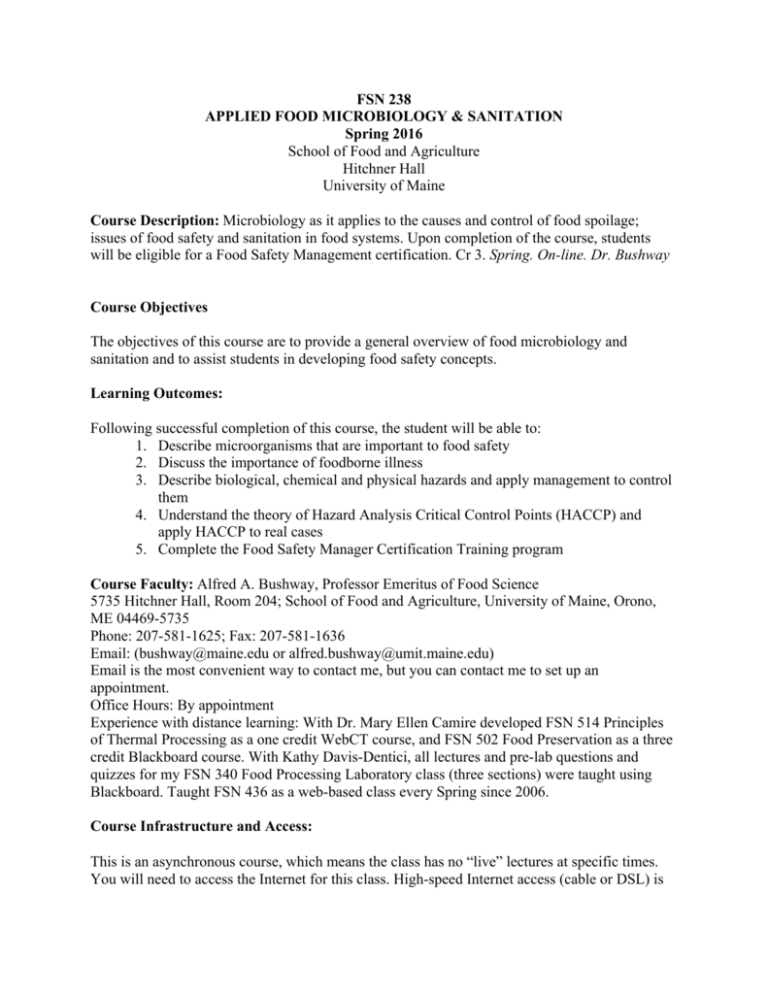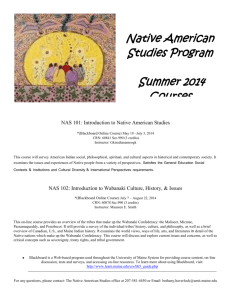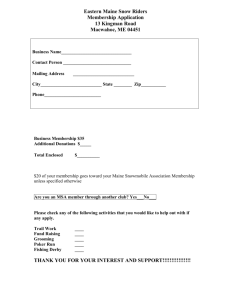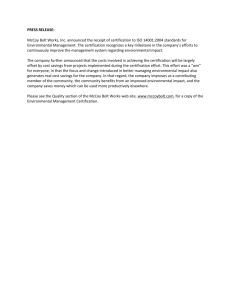FSN 238 APPLIED FOOD MICROBIOLOGY & SANITATION Spring
advertisement

FSN 238 APPLIED FOOD MICROBIOLOGY & SANITATION Spring 2016 School of Food and Agriculture Hitchner Hall University of Maine Course Description:Microbiology as it applies to the causes and control of food spoilage; issues of food safety and sanitation in food systems. Upon completion of the course, students will be eligible for a Food Safety Management certification. Cr 3. Spring. On-line. Dr. Bushway Course Objectives The objectives of this course are to provide a general overview of food microbiology and sanitation and to assist students in developing food safety concepts. Learning Outcomes: Following successful completion of this course, the student will be able to: 1. Describe microorganisms that are important to food safety 2. Discuss the importance of foodborne illness 3. Describe biological, chemical and physical hazards and apply management to control them 4. Understand the theory of Hazard Analysis Critical Control Points (HACCP) and apply HACCP to real cases 5. Complete the Food Safety Manager Certification Training program Course Faculty:Alfred A. Bushway, Professor Emeritus of Food Science 5735 Hitchner Hall, Room 204; School of Food and Agriculture, University of Maine, Orono, ME 04469-5735 Phone: 207-581-1625; Fax: 207-581-1636 Email: (bushway@maine.edu or alfred.bushway@umit.maine.edu) Email is the most convenient way to contact me, but you can contact me to set up an appointment. Office Hours: By appointment Experience with distance learning: With Dr. Mary Ellen Camire developed FSN 514 Principles of Thermal Processing as a one credit WebCT course, and FSN 502 Food Preservation as a three credit Blackboard course. With Kathy Davis-Dentici, all lectures and pre-lab questions and quizzes for my FSN 340 Food Processing Laboratory class (three sections) were taught using Blackboard. Taught FSN 436 as a web-based class every Spring since 2006. Course Infrastructure and Access: This is an asynchronous course, which means the class has no “live” lectures at specific times. You will need to access the Internet for this class. High-speed Internet access (cable or DSL) is required. Lecture notes and links to related World Wide Web pages are provided through the Internet. This class cannot be accessed through First Class; you must use your Internet browser to reach https://www.courses.maine.edu/webapps/portal/frameset.jsp (Blackboard). We recommend using Mozilla Firefox as your Internet browser because it seems to work better with Blackboard than does Internet Explorer. You may download Mozilla at http://www/mozilla.com/en-US/. Lectures for this class have been recorded and placed on the course Blackboard homepage. Course components and readings for all students are available only through Blackboard and the online food safety training program website (www.tapseries.com). Several files on the website are available as Adobe pdf files. If you do not have Adobe Reader software, you may download a free copy at: http://www/acrobat-hq.com/. Reaching the Course Homepage: Using an Internet browser such as Internet Explorer or Firefox, go to the University homepage (http://www.umaine.edu/). Under the heading Academics, you will find a link to Blackboard where you can drag and drop the site to your desktop. If you wish to key in the actual address: https://www.courses.maine.edu/webapps/portal/frameset.jsp Usually, your login will be the same as your UNET or Mainestreet information, for example Jane.Doe and the associated pass word. You will see a Login button, a click here will display all of the Blackboard courses for which you are registered. Click on “FSN 238 Applied Food Microbiology and Sanitation Spring 2016 and you will be taken to a page that shows you any news for the course. From there you can enter the main class web page Technical support can be obtained by contacting Technical Support Services at Help@umit.maine.edu or calling 1-877-947-HELP. Instructional Materials and Methods: Text: Required –Food Safety Managers Certification Training Program including training lessons and one certification examination Optional –Marriot, N. G. and R.B. Granvani. 2006. Principles of Food Sanitation. 5th ed. Spring Science & Business Media, Inc. NY. Importance of time management and adherence to assignment due dates Students will be required to complete lectures, quizzes and exams as scheduled in the course schedule section of the syllabus to prevent falling behind in the course. Food Safety Managers Certification Training Program (30% of total grade): Each student is required to complete the Training Achievement Program (TAP) Food Safety Certification Training Program as part of the course. Many universities use this program as part of their Nutrition and Food Management program. The fee for the Certification Program is $81.00 and includes internet-access (www.tapseries.com), lessons and one examination. The examination will be given at the end of the semester. A website (http://www.tapseries.com/4u/maine) has been created for the University of Maine where students can register for the Certification Program and pay their fee. Once registered (with approval of order), students will be able to start online training lessons. A practice exam is also part of the package. A list of references and other materials will be available on the class website. Grading and Course Expectations: ExamsI&II Quizzes TrainingProgram Grading: A94 A-90-93 B+87-89 B84-86 B-80-83 C+77-79 C74-76 C-70-73 60% 10% 30% D+67-69 D64-67 D-60-63 F<60 Students need to finish associated lectures on Blackboard and the TAP lessons before the quizzes and exams are officially released on Blackboard. Quizzes and Exams will be released at an official time on the date scheduled in the syllabus and will remain available to the student for 24 hours. The duration of quizzes is 20 minutes and 60 minutes for exams. Only students who finish the required assignments will be able to access the quizzes and exams. Food Safety Managers Certification Training program: Students are required to complete 14 lessons and one practice exam following the course schedule. Instructions on how to enroll for the TAP series “Food Manager Certification Training” will be available on Blackboard. To start the program: a. Go to www.tapseries.com, select Start Online Training b. Next, input the username that has been created by you during purchase c. Once the screen opens go ahead and click on the Continue button d. Input your user name and password and click Submit To receive 30% of the total grade from the training program, students should: 1. Finish all 14 lessons, 1 practice exam and participate* in the Official Certification Examination (*a student has to show up for the exam) and 2. Meet the minimum scores requirement, 90% for the 14 lessons and 1 practice examination. To participate in the Official Certification Examination, students should: 1. Finish all 14 lessons and 1 practice examination and 2. Meet the minimum scores requirement, 90%, for 14 lessons and 1 practice examination at least 2 hours before the Official Certification Examination. The Official Certification Examination will be given on the Orono campus during the week of final exams as scheduled. In the case of severe illness with appropriate documentation from a healthcare provider, Dr. Bushway will assign an alternative assignment to be completed at a mutually agreed upon deadline. Course Policy: Deadlines are absolute and will not be extended. Late assignments will not be accepted. If you experience a loss of Internet connection or electricity while taking a quiz or exam, please contact Dr. Bushway as soon as possible and he will extend the time for that quiz or exam. In case of severe illness with appropriate documentation from a healthcare provider, Dr. Bushway will assign a grade of Incomplete with work to be completed at a mutually agreed upon deadline. Incomplete grades will not be given for inability to complete course components due to time commitments or computer failure. Academic Integrity: Academic dishonesty includes cheating, plagiarism and all forms of misrepresentations in academic work, and is unacceptable at The University of Maine. As indicated in the University of Maine’s undergraduate on-line “Student Handbook,” plagiarism (the submission of another’s work without appropriate attribution) and cheating are violations of the University of Maine Student Conduct Code. An instructor who has probable cause or reason to believe a student has cheated may act upon such evidence, and should report the case to the supervising faculty member or the Department Chair for appropriate action. Students who are found to have cheated on examinations will receive an F for that exam. Plagiarism –presenting another’s words, ideas or data as yours will result in an F for that assignment. To check your work for possible plagiarism you can visit the following website. http://www.umaine.edu/fdc Click on “Help you prevent plagiarism” All information for assignments and essays must be properly referenced as to the source. For examples of proper referencing of sources visit the following website. http://www.lib.berkeley.edu/TeachingLib/Guides/Citations.html Select APA Style Guide on left-hand menu. Disabilities (ADA) Statement If you have a disability for which you may be requesting an accommodation, please contact Disabilities Services, 121 East Annex, 581-2319, as early as possible in the term. Sexual Discrimination Reporting The University of Maine is committed to making campus a safe place for students. Because of this commitment, if you tell a teacher about an experience of sexual assault, sexual harassment, stalking, relationship abuse (dating violence and domestic violence), sexual misconduct or any form of gender discrimination involving members of the campus, your teacher is required to report this information to the campus Office of Sexual Assault & Violence Prevention or the Office of Equal Opportunity. If you want to talk in confidence to someone about an experience of sexual discrimination, please contact these resources: For confidential resources on campus: Counseling Center: 207-581-1392 or Cutler Health Center: at 207-581-4000. For confidential resources off campus: Rape Response Services: 1-800-310-0000 or Spruce Run: 1-800-863-9909. Other resources: The resources listed below can offer support but may have to report the incident to others who can help: For support services on campus: Office of Sexual Assault & Violence Prevention: 207581-1406, Office of Community Standards: 207-581-1409, University of Maine Police: 207-581-4040 or 911. Or see the OSAVP website for a complete list of services at http://www.umaine.edu/osavp/ Course Schedule: Date Week 1 1/18 -1/22 Week 2 1/25 -1/29 Week 3 2/1 -2/5 Week 4 2/8 -2/12 Week 5 2/15 -2/19 Week 6 2/22 -2/26 Week 7 2/29 -3/4 Week 8 3/21 -3/25 Week 9 3/28 -4/1 Week 10 4/4 -4/8 Week 11 4/11 -4/15 Week 12 4/18 -4/22 Week 13 4/25 -4/29 Week 14 5/2 -5/6 Finals Week Topic Course overview The Need for Safe Food Training & Certification History of Food Microbiology Introduction to Applied Microbiology & Sanitation The Microbial World Foodborne Illness: an overview Biological Food Contamination Common Foodborne Illness & Intoxication Foodborne Illness (Lesson 4 must be finished the day before Quiz 1 Quiz 1 (2/18) Chemical and Physical Food Contamination Exam 1 (3/3) Must have completed Lesson 5 the day before Exam 1 Food Preservation Hygiene, Health & Food Safety Purchasing and Receiving Foods Storing Food and Supplies Microbial Food Fermentations Preparing , Cooking and Serving Food Quiz 2 (4/7) – Must have completed Lesson 9 the day prior to Quiz 2 Equipment and Utensils (this lesson has to be finished the day prior to Exam 2) Exam 2 (4/14) Cleaning & Sanitizing Pest Control Facilities Management Control & HACCP Systems Practice Exam Preparation for Certification Examination & catch up Official Certification Examination, (given on campus in Orono, ME) TAP Safety Training Program Lesson 1 2 3, 4 4 5 6 7/8 9 10 11, 12 13, 14



